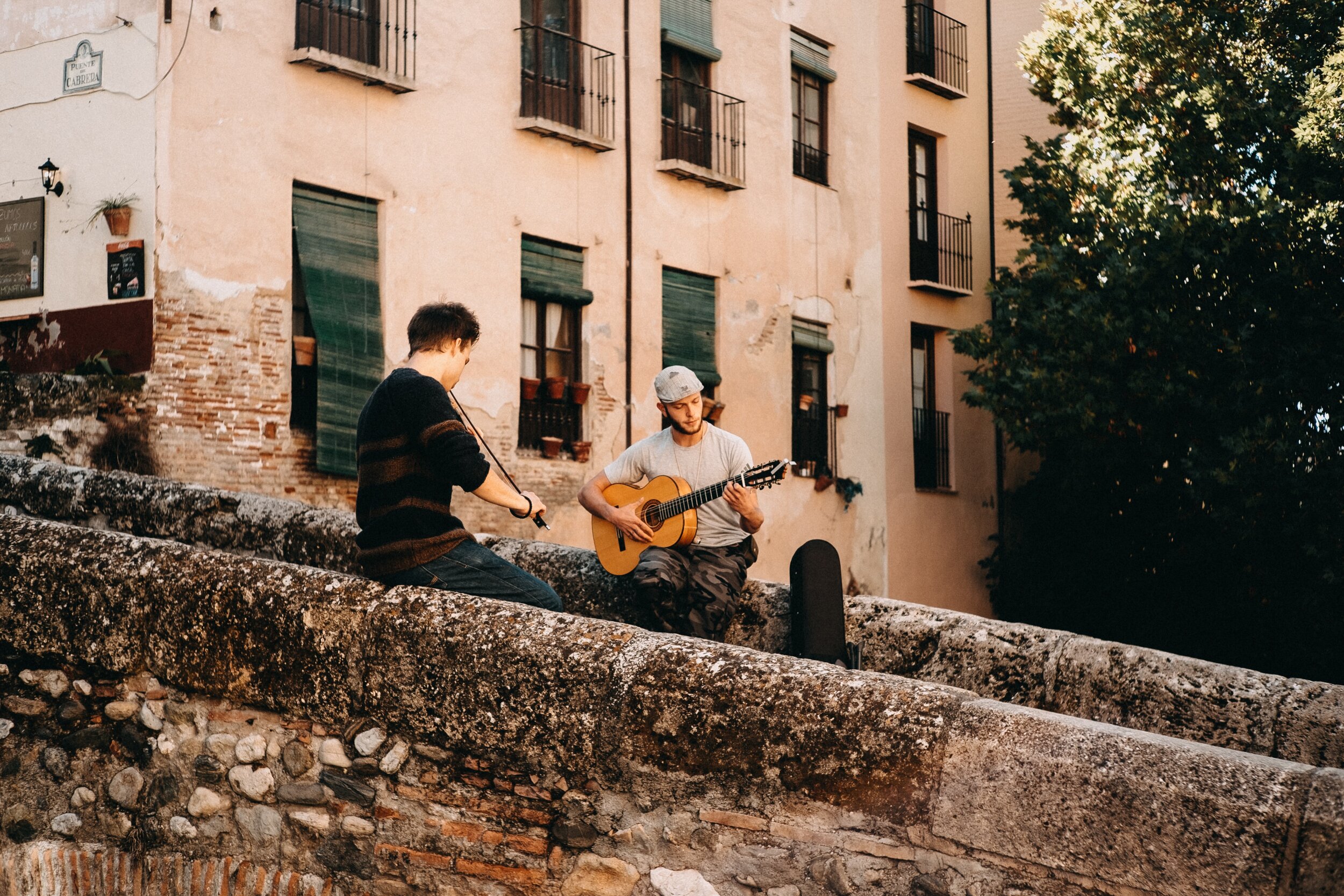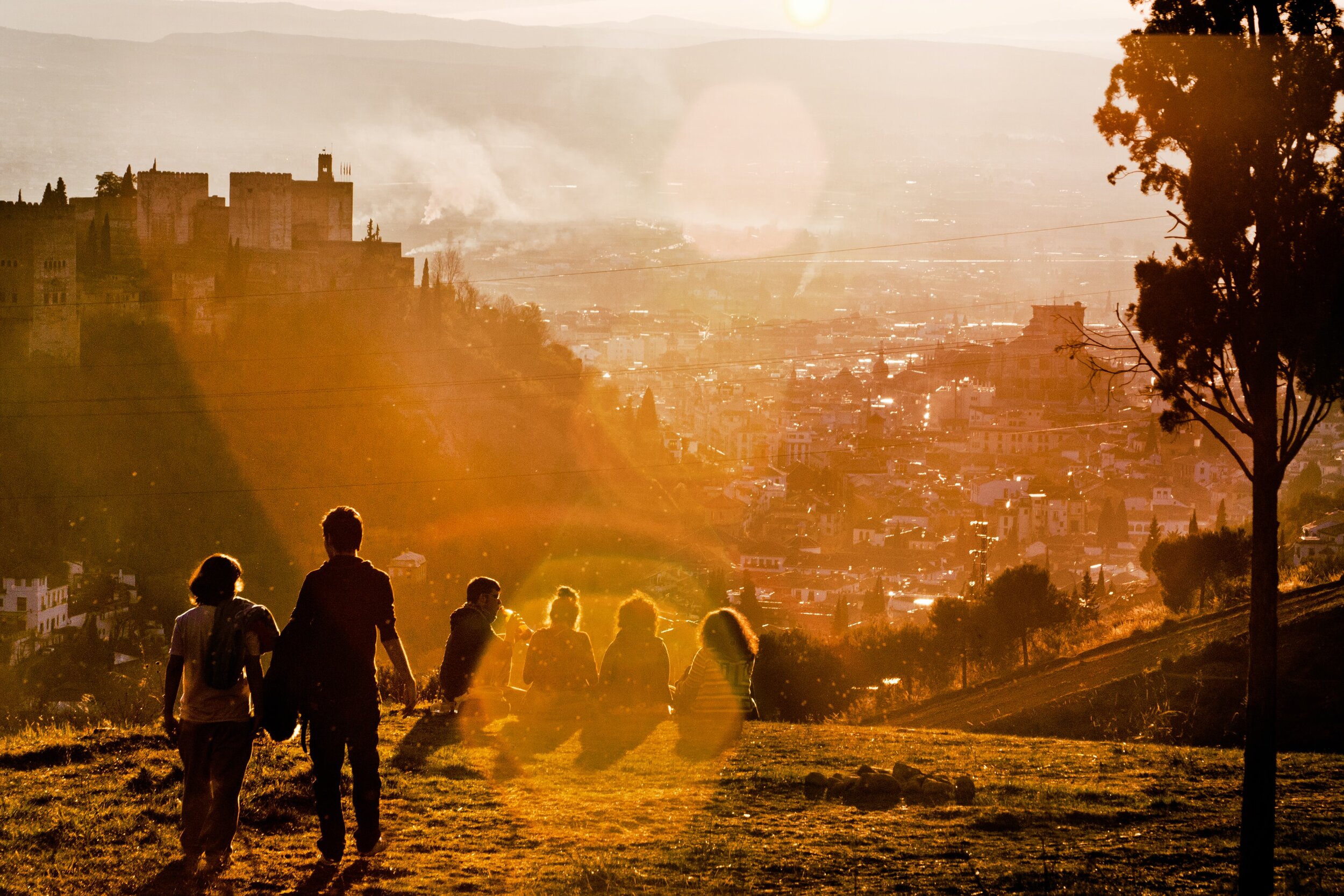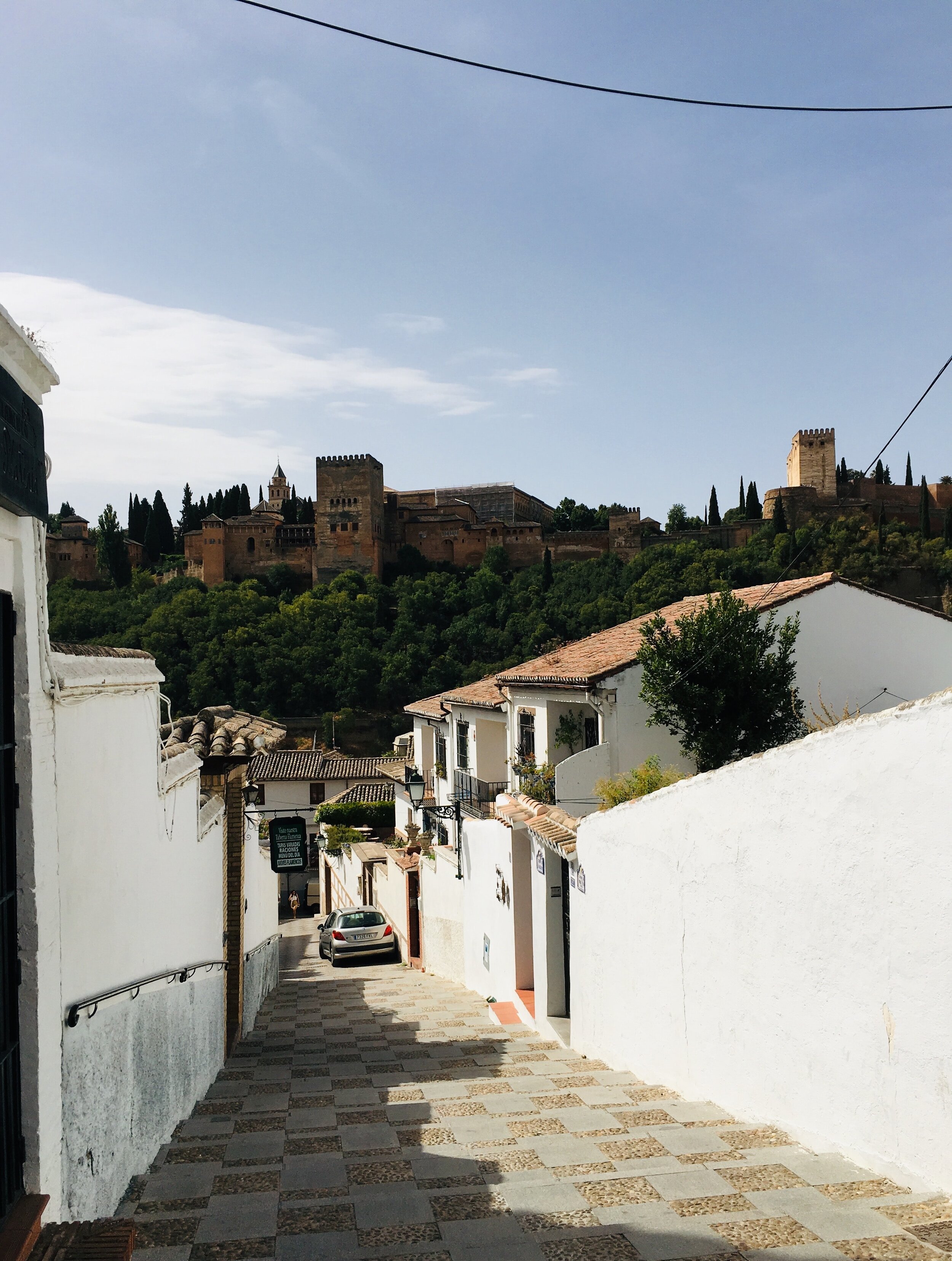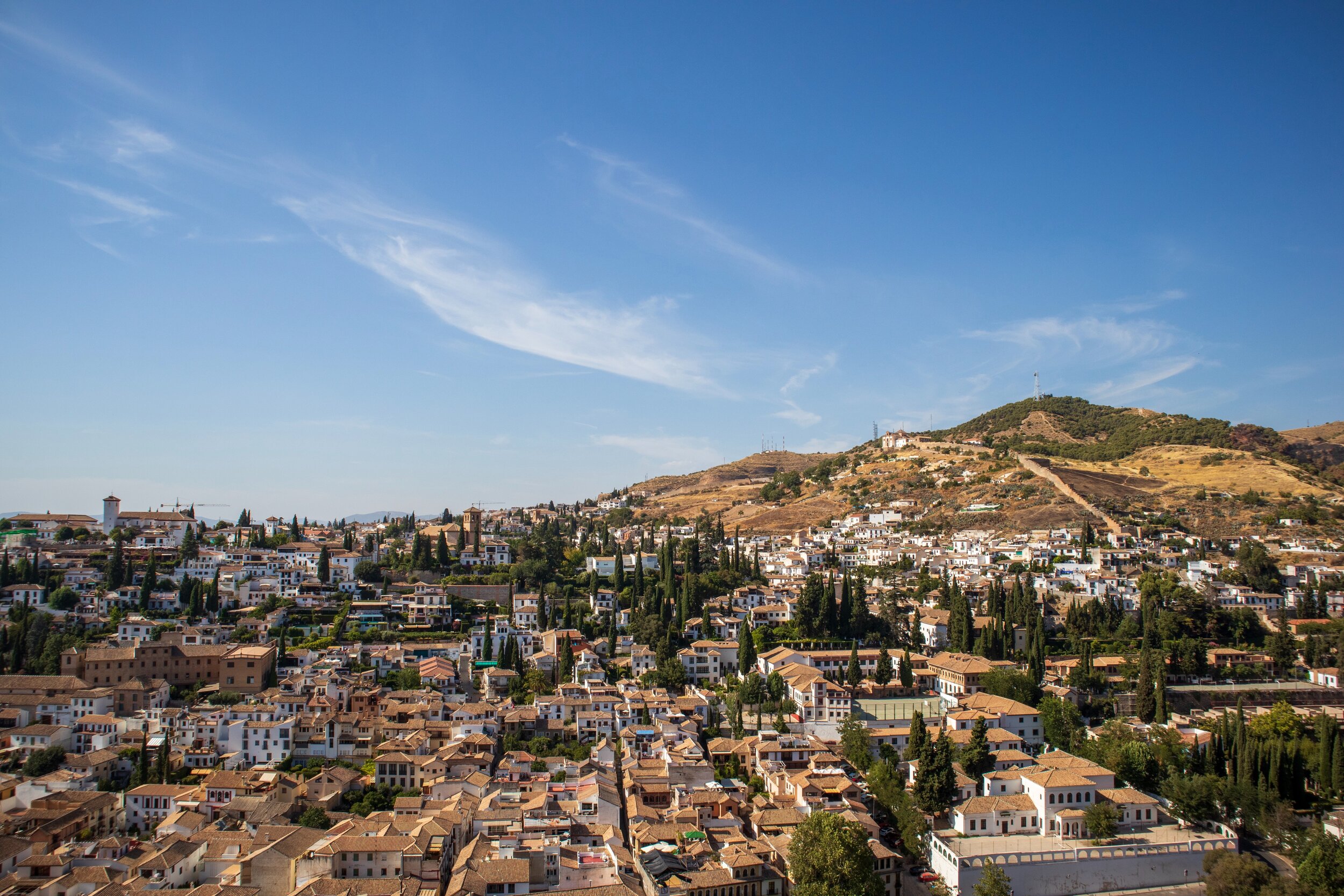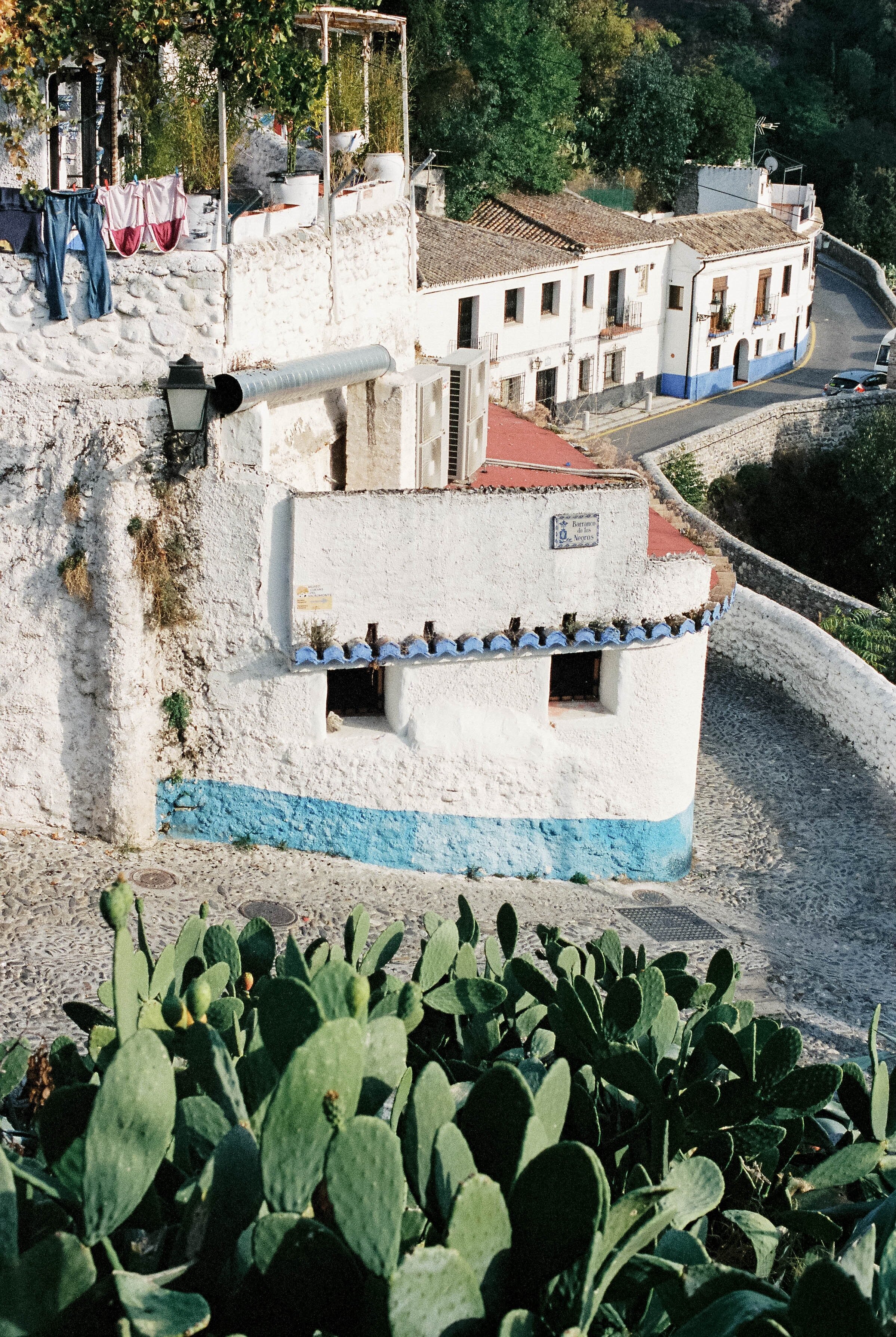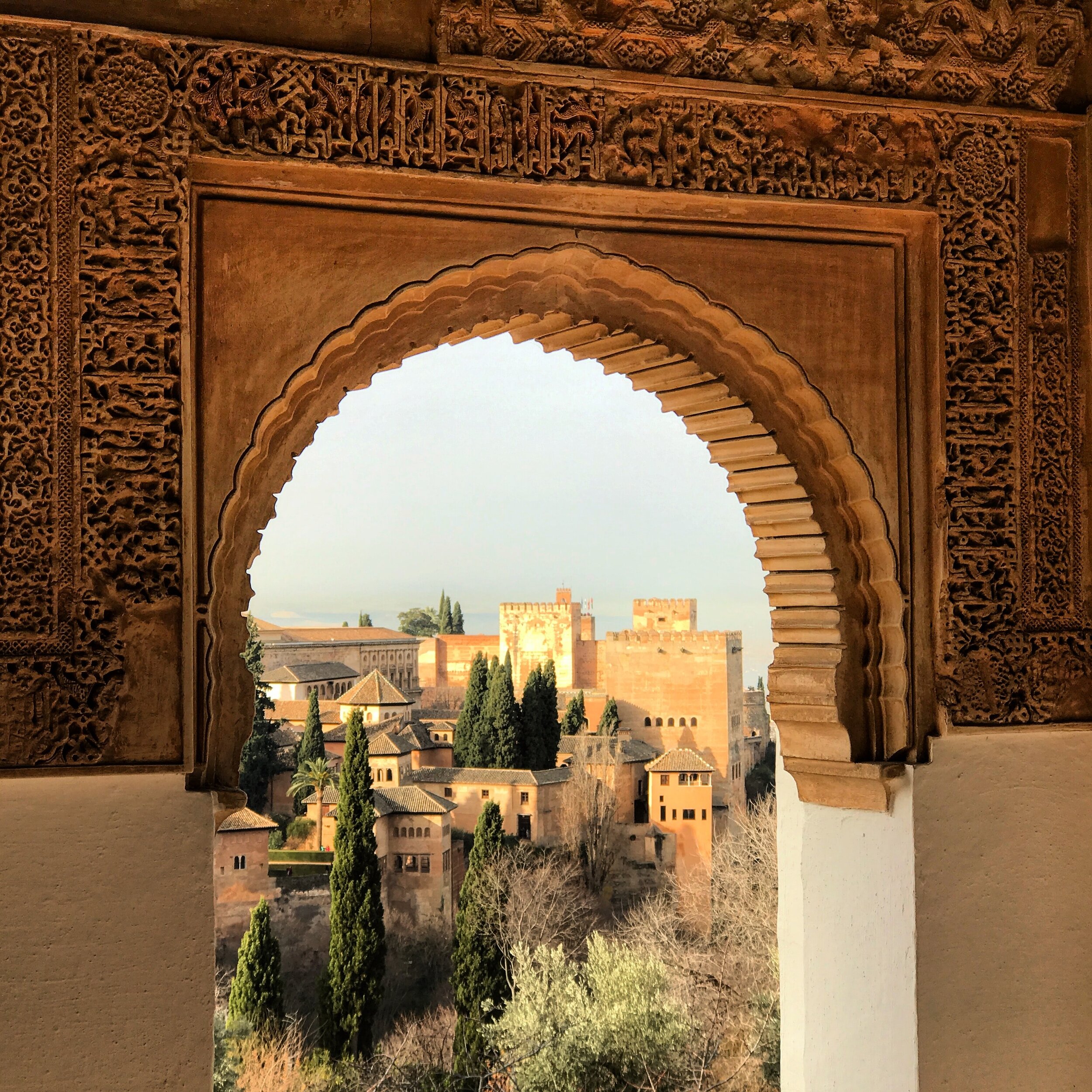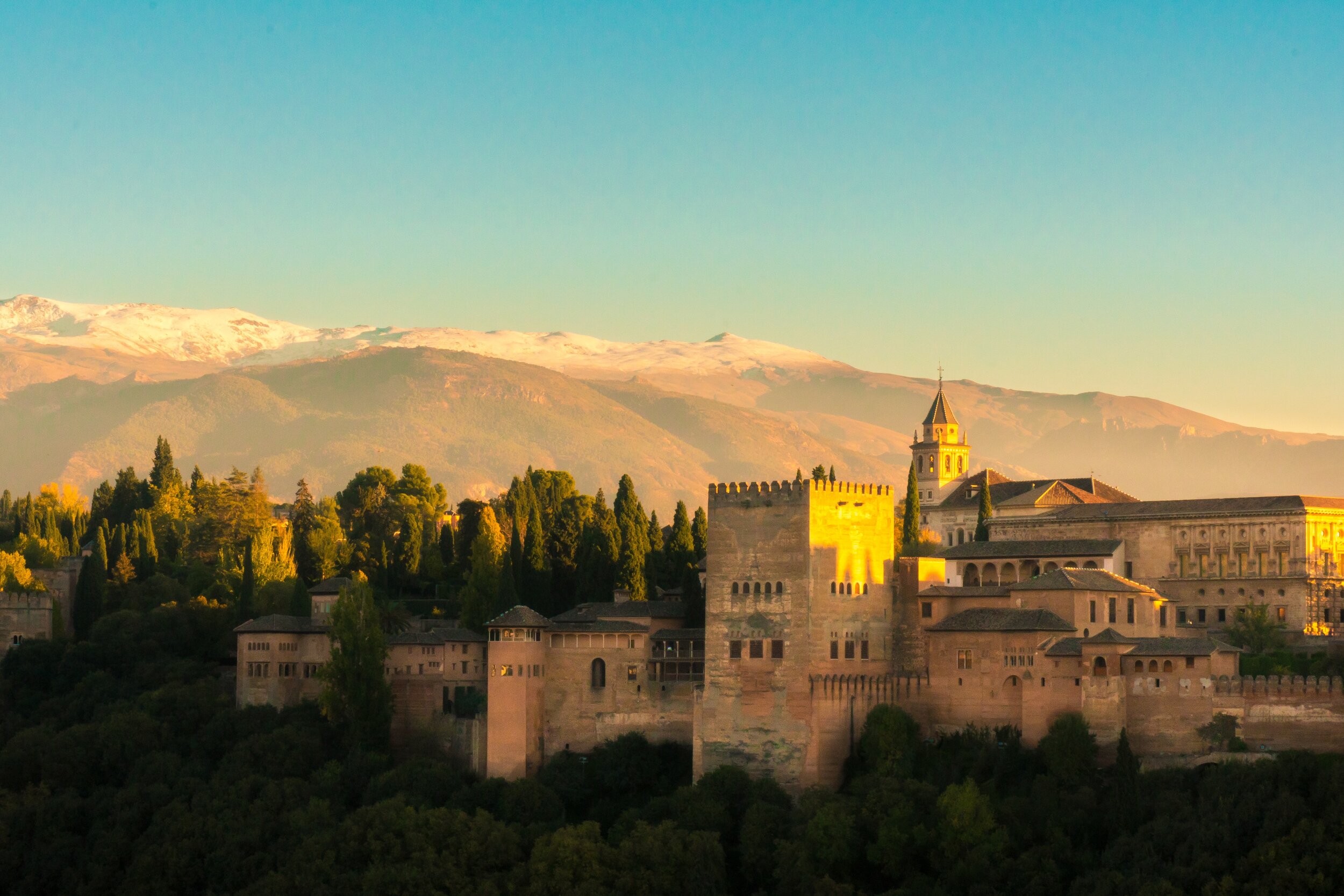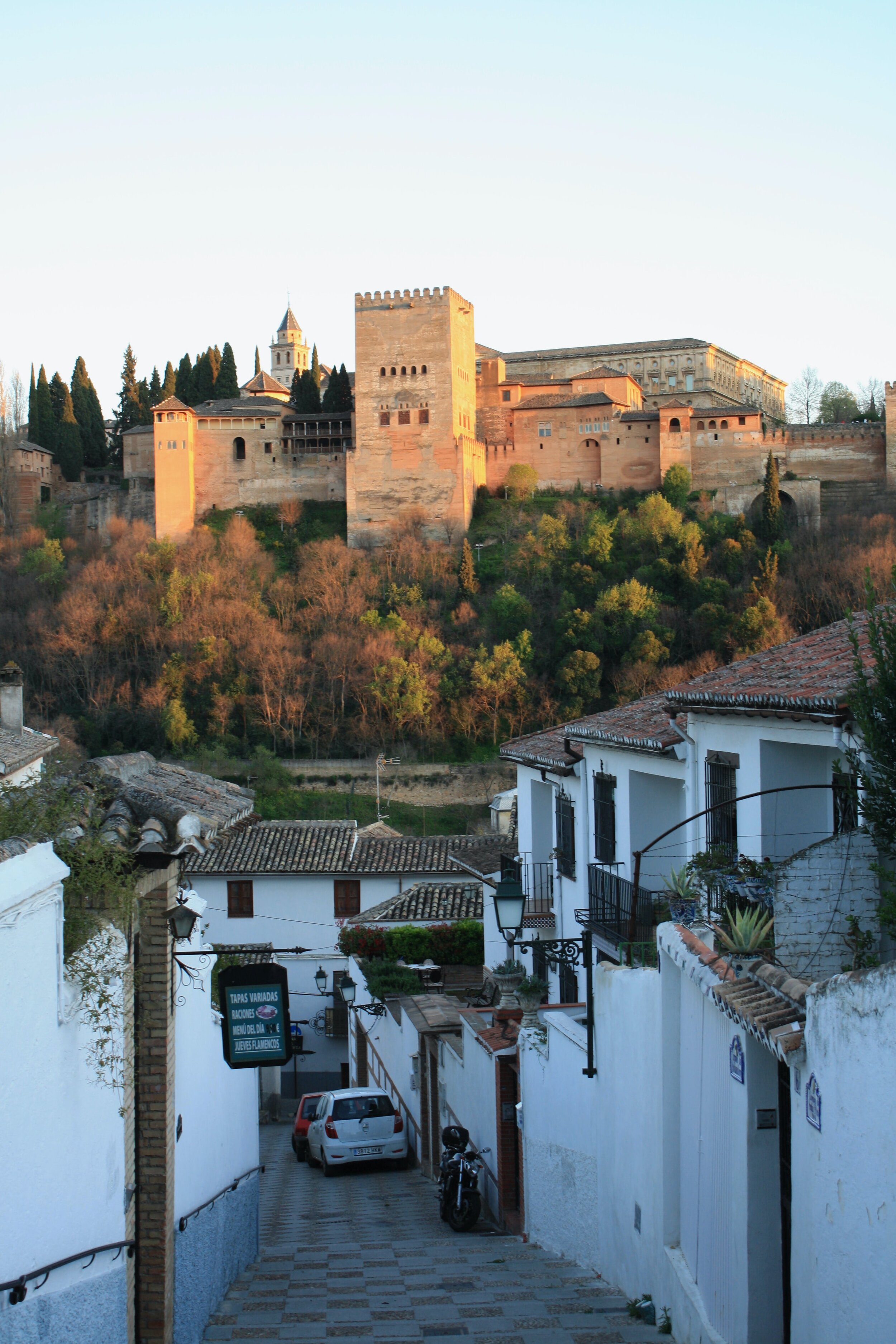LOVE THIS EPISODE?
Help the show! Head over to Apple podcasts to rate and review Adventure Calls.
Episode 20
Wildly different paths to Granada, Spain with Claudia Neiman & Dani Norwell
On today’s show, I interview two American expats, both from the US Midwest, who took wildly different paths to end up living in Granada and founding the website Sincerely, Spain.
But first, let’s imagine what a day in Granada might feel like...
It's an unremarkable day. You're sitting on an unremarkable plaza, in a hilly neighborhood with friends and strangers, chatting, laughing, relaxing under umbrellas and sipping cold beers and munching on free tapas.
It's a Tuesday at 3pm. There's no hustle, no bustle. Most shops are closed. It siesta time in Granada, Spain. The locals might think this is unremarkable. They might think nothing of unnamed plazas and unbranded beers and time that's unaccounted for. But as a foreigner here, you know that there are plenty of other way more stressful ways that a Tuesday afternoon can feel.
In a city like Granada, all the knots in your belly can come undone. Life in Granada is what many believe all of Spain to be like, but Spain actually varies a lot from region to region. It is life in Andalusia in southern Spain that we are all most familiar with. Granada is at the heart of it all.
Here a familiar Castilian Spanish is spoken. Flamenco music is played on beat up guitars, on foreigners in parks and in shows across the city. flamenco is a type of music so familiar so human, that your blood dances and your heart feels like it's found its way home, no matter where you're from. While there are supermarkets throughout the city, locals prefer and will go out of their way to buy meats, cheeses, produce wine and bread from local markets. Long siestas are real, free delicious tacos accompany every glass of beer or wine. And while the city's 250,000 residents get to experience the Four Seasons, the winters are mild and the air is crisp and clean year round. Nestled in the foothills of the Sierra Nevada Mountains in just an hour from the sunny Costa del Sol in southern Spain. You can snowboard in the morning and stroll the beach at sunset. Life could just feel easier here.
None of this however, is the main event.
The Alhambra: the palace on the hill
That is reserved, of course, for the Palace on the hill, the jewel in the crown... the Alhambra. You see Granada is not a sleepy small city in southern Spain. It is a crossroads of history and culture. A hybrid of Islamic, Jewish and Christian tradition and intellectual ism embodied most symbolically within the Alhambra palace, the fortress of the NES resultants the last Muslim Kingdom in Spain.
This moorish palace rises over the city and weaves itself into the fabric of life here today. As much as when construction on it began in 1238 CE. It served as a palace, a fortress and a walled city all in one. With intricate mosaic walls, marble patios, rolling gardens, this UNESCO World Heritage Site remains one of the most important historical sites in the world. It is, in a word, remarkable.
What is even more remarkable, however, is that much like cities of Agra, India, home of the Taj Mahal, and Valladolid, Mexico, the nearest city to Chichen Itza, the Alhambra on the hill, leaves the city of Granada below overlooked by tourists who come in for day trips just to visit the palace. Perhaps it's better that way. Granada is a gem hidden in plain sight.
Sincerely, Spain
What drew today's two guests here is wildly different, although they're both from the US Midwest. Claudia Neiman and Dani Norwell are the founders of Sincerely, Spain, a website where they share their experiences and insights on topics related to living abroad, language learning and culture in Spain.
While Dani followed a more traditional path to expat life, starting with the study abroad semester in Alicante, Spain, Claudia’s parents decided when she was 18 and her brother was 16 to move abroad to Grenada. They moved their family from the flatlands of Wisconsin to the mountains of Granada,
Claudia built amazing friendships, became fluent in Spanish went to university and worked in Granada. But she eventually ended up moving to Finland, where she calls home today.
Dani is still boots on the ground in Granada as the two run SincerelySpain.com, and help current and future expats move there.
In today's conversation, we talk about life in Spain, and we get real about the challenges of expat life.
Find SIncerely Spain
On SincerelySpain.com
On Instagram
On YouTube
On Facebook
On Pinterest
Find Dani Norwell, Author
On Instagram
Dani's book Fairly Familiar
About Adventure Calls
Adventure Calls is produced, edited and written by me, Jessica Drucker. Thank you so much for listening. If you enjoyed this episode, please subscribe, then head over to iTunes or wherever you listen to podcasts and rate and review the show. Every single rating helps so much for me to reach and inspire more people.
If you're feeling really inspired and want to start thinking about how you can actually make your move abroad, pick up a copy of my book on Amazon, How To Move Abroad And Why It's The Best Thing You'll Do is essentially a masterclass in book form. Taking my 15 years experience living abroad and distilling that into 300 pages, you'll get step by step tips on how to move abroad in 90 days, how to get your paperwork together, how to get a visa advice on how to blend in like a spy, how to learn any language in the world and more, head to amazon.com and pick up your copy of How To Move Abroad And Why It's The Best Thing You'll Do today.
Music scoring primarily through YouTube Audio Library:
Pink Flamenco - Doug Maxwell
Arabian Nightfall - Doug Maxwell_Media Right Productions
Echo Sclavi - The Mini Vandals
Image credits from Unsplash:
Jorge Fernandez Salas
Aleksandar Vucin
Callum Parker
Candy Phillips
Clark Van Der Beken
Dimitry B
Girl with Red Hat
Hayley Clarke
Pelayo Arbues
Sebastian Yepes
Tabea Damm
William Justen De Vasconcellos
Full episode transcript
Claudia Neiman
Thanks so much for having us. today. We're really excited. And I'm originally from Sheboygan falls, Wisconsin, and I spent a lot of time in Spain, but now I'm currently in Helsinki, Finland. And
Dani Norwell
I'm Dani, again, thank you very much for having us. I'm from the Chicago suburbs Darien specifically. And I currently live and the new Claudia from being in Granada, Spain.
Jessica Drucker
And did you guys both live in Granada, Spain together?
Dani Norwell
Yes, we overlapped. And we met here not in the US are here for me in Spain.
Jessica Drucker
And so what is Sincerely, Spain? And how did you guys get the idea to start this website and is the current site what you envisioned it to be?
Claudia Neiman
When Dani and I first met each other, it's kind of funny because we were both sort of friends with the same person. And then we sort of drifted apart. And then we sort of became friends with another person and we got back together and then that other person left. And we both realized we’re sort of the only Midwestern girls left in Granada that know each other. And so we started to hang out more. And one day, we were having a glass of wine, and Dani looks at me and goes, I have this idea. I would really like to do this thing where we can give back to other people who want to come abroad to Spain. And my reaction was, that sounds amazing. I'm in… what are we doing?
Jessica Drucker
I love it because it really documents what expat life is like, and that's why I devoured your content. But you I read that in your your post about how you two met was basically just like your your you for a while you thought you were really only friends, because you were the only ones left? And, uh, yeah, from the Midwest. So you have that. But can you guys talk a little bit about that. I mean, Dani, you go ahead if you if you want to start but expat life is, um, it's interesting, because sometimes you feel like you have a community all the time. And then other times it's transient people leave, like, for example, how your co writer, founder and author left you and move to Finland.
Jessica Drucker
So can you talk a little bit about expat life and what it's like to have a community of friends and how people kind of come and go and what that's like,
Dani Norwell
yeah, oh, it's so difficult and it is something we definitely have an article or a few on the blog about how it sucks but everybody leaves and that's why we do think it's really important to have local friends Well, although I will say most of my quote unquote local friends in Grenada were just Spaniards who then left Grenada. So they still left me. It causes you to form a community with different people than you might if you were back in your hometown. And I think that's really beautiful. But yeah, I don't know, I think I'm still building up that resistance to losing people constantly and still wanting to form close bonds.
Jessica Drucker
Yeah, that's the thing you want to and on some level, there's a part of you that knows, like, why have friends all over the world? Because now if you want to go to Finland, you know, Claudia's in Finland. So you have that. But Claudia, how did you end up in Spain? How did you feel when you first got there? And what what is life in Spain, like for let's say an American expat?
Claudia Neiman
Yeah. So I think that every expert that we've met has sort of had a different story. And all of our stories are different, but the same, if that makes any sense. And I ended up in Spain, because when I was actually when I was 17, my parents said to me, okay, we want to move to Spain this year. And I was like, wait, I want to graduate high school. And they were like, okay, we can wait one more year for you to graduate high school, but when you turn 18, or leaving,
Jessica Drucker
And they're taking you with them, or they were just like we're going if you want to come feel free.
Claudia Neiman
Um, so they moved with my little brother, who was 16 at the time, and I was Welcome to go with them. But they wanted, they wanted to have a new experience. And it was a temporary thing. It was only meant to be two years. And that year, I was supposed to go off to college. And I said, Okay, you know what, I'm gonna take a year off, because my mom's English. And then so that's a really common thing to do in the UK is take a gap year, or at least in my circle. And I took a year off and I became a nanny in Spain. And that put me in really close relationship to my parents, which was really nice. And then when I finished I was like, okay, no, I really want to learn Spanish. And I told my dad, I'm like, I got in, I was, I was gonna go to ASU. Like I had everything sorted out, I even had a roommate, I was talking to this roommate, this girl I was going to live with. And my dad goes, I can't believe you're gonna pay $30,000 a year to study Spanish when we live in Spain. And I said, that makes sense.
Jessica Drucker
Sometimes they're logical, aren't they, parents?
Claudia Neiman
They're so logical. And the next day I was on the phone with the advisor, and I said, What can I take online? And I took some classes online, I took a year online. And then I said, Okay, you know what, I want to do something different. And eventually what it was what I ended up doing was going to university in Spain, because it's so much cheaper than in the US. I paid less than 5000 euros for a four year bachelor degree and a year long Master's. And I think that it was a great experience. And it was a really great investment on my side. Because now I can do something different. I can go back to school if I want to, if I want to do something different. I know what, like higher education looks like I know what it looks like to go to university. I know what kind of work it takes. But I don't have a mountain of debt for something I didn't want to study.
Jessica Drucker
Call, you just don't like just to zoom in a little bit on this because so at first I read that your parents move when you're 18 at that, like, first of all awesome parents in a way but also so different, especially like Midwestern parents, but your mom's British. So now I realized there was kind of a already an understanding she was already abroad by living in the US.
Claudia Neiman
My mom is British, and my dad is actually from Seattle. So I am the least Midwestern girl that grew up in the Midwest.
Jessica Drucker
Okay, God, so everyone was already had like a transplant from somewhere else. So it just it made sense to move abroad to Spain, especially the British go quite often to move abroad to Spain as well. So that's like a well worn path.
Claudia Neiman
Exactly. And it was really nice, because when I was 18, both of my dad's parents had actually already passed, but both of my mom's parents were live and living in the Midwest, going to the UK every year was something that happened at Christmas. But as soon as we moved to Spain, it was something that we could do regularly. And I think I spent more time with my grandparents those last couple of years than I had spent all the previous years together.
Jessica Drucker
Wow, that's really special. So the last thing, Claudia, that just to be clear, though, because your mom is British, and therefore so are you I would imagine, by extension, your visa situation was a lot easier for you and your family to acquire because you kind of at that time there was not even Brexit. So you were just able to move.
Claudia Neiman
Exactly. And by extension, my father being married to a Brit was able to stay in the country as well, which made it a lot easier for us.
Jessica Drucker
Right. And that is an advantage that not every American has. So it's awesome that you took advantage of that. And then Dani so how did you end up in Spain at first and you've been there eight years now you said right.
Dani Norwell
Yeah, my first experience was in Alicante. I was studying Spanish as one of my majors at a university in the US. So that was just something that I did for a semester abroad and loved it. I had an amazing experience living with the host family and speaking Spanish and just getting to know a little bit about the Spanish culture. And I say a little bit because at the time, I felt like I was so immersed. And then the more years you spent afterwards, you look back and kind of left that I was definitely in the American study abroad student bubble, that first semester. But then I came back and did a teach abroad program. So the government has this program called auxiliaries, which is essentially like a teaching assistantship program, which is probably the easiest thing for you to do. If you are an American who wants to be able to work in Spain, and you don't mind teaching. It's not that many hours, and it's actually considered a student visa. So that's what I did. That's how I got back to Grenada.
Jessica Drucker
So after you had graduated, you went and you became a part of this teach abroad program?
Dani Norwell
Yes, exactly. I did return to the US and finish my degree. And then this is
Jessica Drucker
they share that part of our story, though, because I studied abroad in Costa Rica, and was just like, this is amazing. How can I keep doing this? And so I actually took a semester off and freak my parents out and then stayed for the year. And then and then I went back to graduate, but I completely understand like, study abroad just completely changes your your world and shakes everything up. Not everybody stay. It's not everybody wants to go back. Some people do their study abroad, and then they just go home. And they don't they don't ever move back to that place. Why? What was it about your experience in Spain, where you're just like, I want to go back and continue this.
Dani Norwell
It's really hard for me to put into words. And the only thing I would say is that I visited Grenada for one weekend during that study abroad semester. And it was organized by my program. So I didn't even choose to visit the city. But I just fell in love with the city. I always say Grenada has winning gumbo, which is essentially like, it's charming. It is just, I don't know, enchanting, it's very enchanting place. And I just love the feeling here. And I instantly felt at home in a way that I actually realized I didn't even feel necessarily at home, and my parents have since moved from my home at home. So this has become a more solid place to me over the years.
Jessica Drucker Yeah. And it's so interesting how, you know, we have this really strict idea of what home is, and then you get somewhere and you're like, this is home, like you just know it, I talked to so many people who feel the same way, whether it's Spain or somewhere so different, that they could never have imagined, you know, like Japan or China, you just feel like so at home? What, um, what are some things? Claudia, maybe you? You have some opinions on this, especially now looking back, but like, what are some things about Spain that you found to be really easy to adjust to? And then what are some things where you're just like, this is this is too hard this?
Claudia Neiman
Yeah. So I think that and I think Dani can come from this, I had a really privileged and Princeton thing, because when I decided to move to Granada permanently, and go to university there and study for the university entrance exam and start my classes, I already had a base established. So my little brother and I were 23 months apart, and he had friends, he had a community. I like I started playing soccer with him and his friends, I it was almost like I had a premade community to go into. So I do think that income in comparison to a lot of experts, I started off with a lot of Spanish friends. And that was something that was easy for me, not because it's easy for me, per se, but because I had support in that area.
Jessica Drucker
How do you sort of manufacture that community? So you caught a you luckily had that committee because your brother, but like, you know, Dani, what would you recommend for people who are going to take the leap and who I mean, I recommend the same thing. And, you know, sometimes my advice is like, you know, find your your subculture so like whatever you're into, like if you're a crossfitter if you're a marathon runner, if you're whatever it is that you already do at home, in a global world, like we all everyone does the same things. Now we all watch Netflix, and you know, whatever, like we all have things, but finding your subculture is a way to like get into the local community. But if you don't speak Spanish, that can be hard. So what are some things that you write about or talk about? Through sincerely, Spain that can help people kind of manufacture that built in community when they arrive?
Dani Norwell
Yeah, I think the first thing we would recommend is to live with Spanish people. And of course, that's a lot easier if you speak Spanish, but you can also find a lot of young Spanish people who would love to practice their English with you so it's not a complete. It's not something that's completely unavailable to you if you don't have strong Spanish. And I think that that makes a huge difference. Most of good Spanish bye Are people who have lived with because they're integrated into your life, they're there, when you wake up, they're there at meals, you learn about how they do life and how they see things. So I would say that's number one. And then intercambios our language exchanges are another way that we tell people to get involved. Because again, you go, you meet people who are willing to meet new people who are open to that idea, who want to learn about different cultures who want to practice different languages.
Jessica Drucker
But and that's important, because Sorry to interrupt you. But that's really important. Because, like, think about your life in the US, for those of us who had or have one, you guys are very far removed from that now. But your life, you don't open yourself up to strangers, especially like people from like Europe, who just moved here or somebody you know, from China, you don't just like, hang out with them. But there are people who do do that. And you can get involved in those communities in Spain is called intercambio. In Germany, it's called a stammtisch, where you get around the table and you talk to each other. And people want to have those language exchanges. And like, it doesn't mean they're going to be your best friends from that. But it's just amazing to know that like, yeah, every Tuesday, you can go to a place. And people are going to sit around and listen to each other's like bad languages, and get along with that.
Dani Norwell
Quality. And I met it and intercambio for example. Yeah, so that was seven years ago now. But like we said, we weren't really friends from that beginning, I would say maybe like five years since we're actuallyfriends.
Jessica Drucker
Right? You just kept running into each other at stuff.
Okay, and so let's talk a little bit about Spain generally, because so I know a lot of people think about moving to Spain, and you say, you know, live with people, but like, you know, from from me, or, you know, someone like me, where now I would move with my family, I'm probably not going to live with like, some really cool younger Spanish people who would be awesome, but they probably don't want to live with us, with a screaming baby. And so, um, so what are we, first of all, like, Where are our cities that people might not consider living in Spain, you know, that are not as well, no, I think people know, like Madrid, Barcelona, which is great, but also harder, more expensive, usually more of a challenge. And then, um, you know, what do you advise for people who are coming maybe as a couple or are a little bit older, because I mean, I feel like people I talked to are of the whole spectrum who want to move to Spain, they want to retire in Spain, they want to have families in Spain. So just some some advice for people who are maybe in their middle of their career or looking to retire.
Claudia Neiman
Yeah, I mean, I definitely relate to this, because this is what my parents did. And I actually feel like we have quite a lot of friends, expat friends that have done something similar, where they move over as a couple. And I know people that want to retire in Spain that actually my mom is, like, help coaching because he's not exactly sure how, how the best way to do it is in what city Do you want to go to? And I think they're all really good questions. Like, like you said, I would personally probably avoid big cities. But that's because I'm not a really big city person. But I really think it depends on your own preferences. And the number one thing I would do is take some Spanish classes, and then try and get to know your local bar, and your local corner store, and your local coffee shop and just talk to those people and start to build many relationships with people around you. Because when I see my parents who are now in their 60s, and their Spanish is in great, they have really good relationships with the people in their neighborhood. And they can go into a bunch of different bars. And like, the waiter will be like, Oh, yeah, we have a table for you. Like there's no room in here, but we have a table for you, you know, and just try and slowly build up this small relationship. So whether it's a big city, like Nintendo Barcelona or a smaller area, like Granada, or the opposite would be Bilbao in the north. I think you can find community wherever you go, as long as you look to build it from the ground up. And I do think that taking one or two Spanish classes is really important for that because a lot of people aren't comfortable in their English.
Jessica Drucker
Well, and it's also just not fair. It's not fair to just make everybody switch into English just for you. You know, all the time eventually you should learn.
Claudia Neiman
Welcome to Finland. Okay, but…
Jessica Drucker
I was going to actually ask you a couple of things about Finland real quick. First of all, Finnish is different. I don't think a lot of people expect you to speak Finnish, do they?
Claudia Neiman
So no one expects me to speak Finnish. And when I tell people that I want to learn Finnish and I'm actively trying to learn Finnish and I have some learn Finnish books and I'm taking some Finnish courses. People are like, oh, wow, why exactly. But I feel really strongly about local languages. And I feel that when you speak someone's language, you can understand them. I at a different level than when you're speaking, like when I speak English, I don't want to say I'm a different person, but different parts of me come out then if I'm speaking Spanish or if I'm speaking, I also speak Portuguese. And I feel like it's not fair also to my Finnish friends, and I've now made a really big effort to make Finnish friends and I have some really amazing Finnish friends. I think it would be really awesome if I could also communicate to them even basically in their own language, because while they've done so much for me in English already,
Jessica Drucker
and Claudia the elephant in the room, why did you leave? Why did you leave Dani? No. Why did you what prompted you to move to Finland? And I asked you because I think what people don't realize too, and I don't know if this is true in your case, but once you've done it, you have a blueprint for it. It's way less scary. And so moving to a new country is just like a thing you can do. It doesn't require as much momentum to get started. That might be totally wrong. Why? I don't know, I'm not sure maybe you're running from the law. But why did you relocate to Finland?
Claudia Neiman
I am definitely not running from the law. And it's definitely true. So in addition to Spain, I've also spent time living in Brazil and Portugal. So Finland isn't even number three on my list. I think it does get easier, the more places you go, because you know what it takes to create a community and find a place for yourself doesn't make it easier, but at least you know what you're up against. But I came for work. And all those things that you were saying about feeling like you found someplace that's more like home than home. That happened to me here. So I never really felt like I belonged in Spain, which sounds not good. Because I have my family there. I went to university there. I have friends there. I have a lot of amazing things in Spain, Spain is so such an beautiful country. And exactly like Dani said, there's something so special about Grenada, and every person that I meet outside of Spain, that's important to me, I'm like, you have to go to Grenada, go stay at my parents place, they'll take care of you, they'll take you to all my favorite topless places. But it wasn't a place where I saw myself in the future. And then so when the opportunity came for work, to try somewhere else, I was like, Yeah, sure. Why not? It's just another country. No big deal.
Jessica Drucker
Can I ask you, Dani, about some of the culture shock stuff in Spain that you experienced? But like, what were some of the hardest things for you living in Spain? Just to put it back to Spain for a little while? Yeah, what are some some feelings of cultural shock you experienced when you were there? Coming from the US?
Dani Norwell
It's It's funny, because some of the things I love the most now are definitely the things that I think surprised me at the beginning, kind of it's beautiful and magical. And then at the same time you're like, but why can't we just get things done, right? Because in Spain, like it did,
Dani Norwell
it depends, of course, it's going to be different. If you're in a big city of Madrid, compared to a smaller, especially in the south, things have run a little bit slower where we're at. But it was weird at first that in the middle of the day, a lot of stores shut down. And you just you can't you can't go and do banking. I don't know how people with a normal job do banking, because they're only open till 2pm. Monday through Friday. And so to me, that's, that's just wild. And I think that has changed over the years. But when I first got here, I had to ask off a day for work because I couldn't go and get my bank set up. So I think that was surprising. But it's also beautiful. Like when you are traveling you love that things are slow and you love that. They're not rushing you away from your table. If you're at a restaurant, they never bring you the bill, you have to really like get them to come back and bring it to you. Otherwise you could stay for hours on end. And that's beautiful until you're in a hurry and you have an appointment to get to and you can't get the waiter to come over and pay attention to you.
Jessica Drucker
If you make your own money if you're a freelancer, if you own your own company, I think Spain is such an awesome option. I don't know if you guys would would agree what what kind of jobs do you think are the best to hope for or look for when you're in Spain,
Dani Norwell
that if you freelance or own your own business, I mean that is the ideal. They do have high taxes in Spain that is something to be aware of. So if you are an entrepreneur, you are taxed for it more so than I think in the US. But also I mean, I think teaching if you're a foreigner is big business, everybody wants English classes. And so even in Granada not as much but like Madrid Barcelona you could be charging like 25 euros an hour and again in Spain that's big money.
Jessica Drucker
So now that you have moved to Finland does your Claudia does your world kind of opened up for you? Do you? Do you think that you have like more of a career that you can go after there or do you feel like you're more countries specifically you Want to remain in Finland? Is it more about the country or more about the career for you?
Claudia Neiman
So for me here in Finland, it's definitely about the country. But I also feel like there are more career opportunities, and then even just sort of like going more north. So now I'm more north, I'm closer to Sweden, I'm closer to Norway, I'm closer to Germany and closer to all these more northern countries where there is more opportunity for career development. What What would
Jessica Drucker
you recommend people really think about before they move, and then you know, any advice about how to sort of set up you know, you talked about talking to locals and corner stores and all that, but like, what does it take to build a life for yourself in Spain? Dani, maybe you could take the first swing,
Dani Norwell
I would say you just have to be open to everything in reality, I mean, because there are going to be so many unexpected, it's no matter where you move abroad. And in the scheme of the world, Spain, isn't that different from the US? I think it's funny, because when I first came here, I thought I was having this huge cultural experience. But then again, the more time I spend here, and the more I learn about other people in other countries, I think this is really comfortable for me. Like it's a language that shares a lot of roots with English. And we have a lot of the same ways of communicating. And I don't know, there's a lot in common. So I think it's being ready for whatever comes your way. But also recognizing that you're going to find things that do feel comfortable that are normal. So you and just expanding what your normal is, I think is is huge.
Jessica Drucker
And what sort of things do you find that you got really comfortable with in Spain? What are some things that feel like, like, just like really comfortable for you?
Dani Norwell
Oh, I'm always late now. Which is, I know, it's a stereotype of Spain that I shouldn't perpetuate, because I have a lot of Spanish friends who are much more punctual than I am. But I just have this no pasa nada, like it, it doesn't matter Hakuna Matata kind of feeling. So I'm late to a lot of things. And I eat at the Spanish times. And I think that it's so much better for me and the way that I live my life. So instead of stopping at noon for lunch, we don't have lunch until maybe 3pm. And then we don't have dinner until in our house without nine 930 which is even kind of early for Spain.
Jessica Drucker
And then cleany I know you had a little bit of a different intro because your parents made the move. But what would you advise someone moving to Spain for the first time? First of all, like? Like, what did your parents You know, when you look back at their decision, you know, what gave what pushed them to do it? What did they move to Spain for like the weather? Like, what was the push for them? And then how did they sort of because, you know, they they really having an 18 year old and a 16 year old there? They are. I believe there's a lot of parents out there listening who are just like, kind of can't wait till they graduate. So you can go do this, like what had they get that in them to go to Spain like that?
Claudia Neiman
Yeah, I mean, first of all, I just like to say for all you parents out there that have kids that are not graduated yet, this was the best gift that my parents could ever give my brother and me. We are now both fluent in Spanish. And I mean, that's that's an amazing gift, considering how old we were when we started and how integral it was to part of our experience, life experience, like my brother went to high school in Spanish. And that's just an amazing gift to give to your kids. So don't be afraid to give that gift. Even though as a high schooler, I was afraid to receive that gift. But I would say so what my parents did was they visited before. And even before they visited, we were lucky enough to have some family friends that are from Catalonia, which is the area of Barcelona and they sat down with these friends in a bottle wine and they said okay, we're in Spain could work. And they said, okay, it can't be Barcelona, it can't be Valencia. They don't really speak Spanish Madrid is too expensive. If you go to the north, they speak Basque. If you over here, they speak a different language. And they ended up in Granada. Because Granada is a relatively inexpensive student city where University is good. And I would say that even if you don't have a person that can help you with that. Try to find resources that help you evaluate the different places you're looking at so that you find something that fits your needs, so that you don't end up in Valencia with an apartment rental for a year expecting to speak Spanish and then realize that really local speak valenciano does this sort of like I know there's something really beautiful about just winging it. But if you're up in your life and moving away, my suggestion would be to just plan a little bit to make sure you're choosing a place that fits your needs. And that doesn't mean that you won't want to change something or you want to move somewhere else or you'll end up in Alicante and then decide that Grenada is the place for you. But it does give you a better chance than if you just randomly push a pin into a map.
Jessica Drucker
No, that's really smart. And I think that's great advice. People actually underestimate how many languages are at least dialects are spoken throughout Europe. It's not just in Spain, but especially in Spain, people don't just speak Spanish. And if you try and speak Spanish, in certain areas, people it's like it, there's, there's more charge behind it than you even realize, because you speaking Spanish isn't just like, Oh, we don't speak that here. If there's anger around that for various reasons. So yeah, it's not a joke. What, um, besides sincerely, Spain, you guys, because obviously, that's a lovely resource. But what are some resources that would help people also move to Spain that you can recommend and then you know, if you guys have any, obviously any blog posts that you've written that you think are particularly helpful,
Dani Norwell
I'm just thinking off the top of my head, there's a website called Spain guru. And I believe it's run by or at least there are a lot of really active lawyers in the group. And they talk about different visa options, and they have a lot of articles. They also have a Facebook group, if you want to just like scour other people's questions. I've found that really useful over the years, and I know a lot of other people have as well.
Claudia Neiman
Yeah, I think you can find a lot of Facebook groups that are dedicated to expat communities in Spain, and you can get really specific people that come with families, dog owners, that kind of stuff. I think it's really good. I listened to a podcast called when in Spain. And it's just sort of nice to get some information. And the guy who runs it is a Brit. And he goes into all different sorts of topics. And some of them might be more useful to people, for example, coming from the US, and some of them might be less, but I think it's really interesting to get these different perspectives. And I think that's a good resource.
Jessica Drucker
And then yeah, and then where can people find you? And where can we find sincerely Spain online, your all your social handles all that stuff?
Dani Norwell
Well, first Sincerely, Spain: www.sincerelyspain.com.
Instagram @sincerelyspain
YouTube
Facebook
Pinterest
@dani_j_norwell


